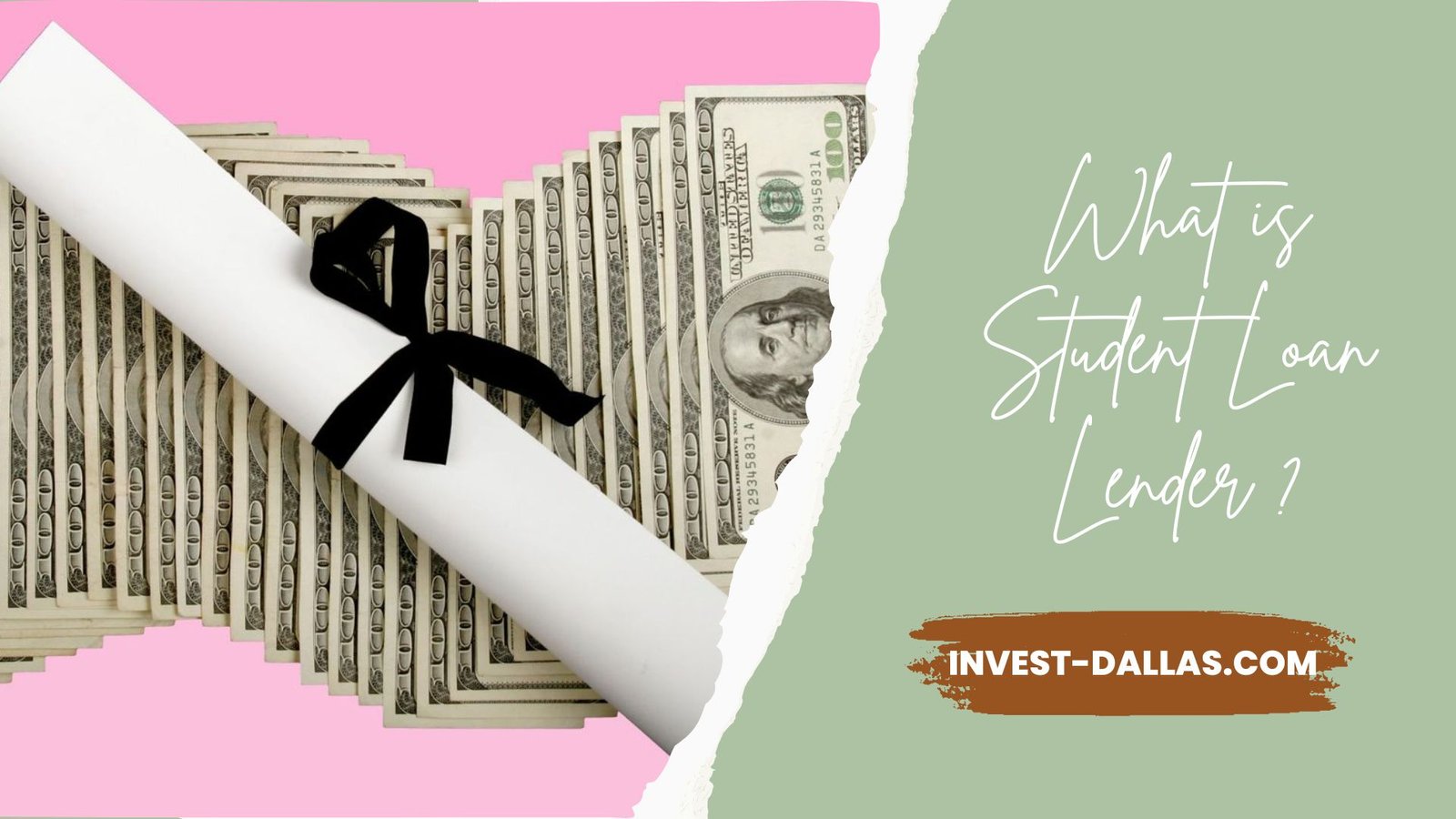
Student Loan Lender
What is Student Loan Lender? Everything You Need to Know
If you’re planning to pursue higher education, you may be considering taking out a student loan to help pay for tuition, books, and other expenses. However, before you apply for a loan, it’s essential to understand what student loan lenders are and how they work.
In this article, Invest-dallas.com cover everything you need to know about student loan lenders, including the types of loans they offer, the application process, repayment options, and more. So, let’s dive in and explore the world of student loan lenders!
What is Student Loan Lenders?

Student loan lenders are institutions or organizations that offer financial aid to students who wish to pursue higher education. These lenders may be private banks, credit unions, or government agencies, such as the U.S. Department of Education.
Student loan lenders provide borrowers with funds to pay for tuition, books, room and board, and other college-related expenses. The amount of money a borrower can receive depends on various factors, such as their credit score, income, and the cost of attendance at their chosen school.
How Do Student Loan Lenders Work?
Student loan lenders work by providing borrowers with a loan that must be repaid over time, usually with interest. The borrower will receive the loan amount upfront, and they’ll be responsible for repaying the loan according to the terms outlined in their loan agreement.
The terms of a student loan agreement will vary depending on the lender, the type of loan, and the borrower’s financial situation. However, some common features of student loans include:
- Interest rate: The interest rate is the cost of borrowing money and is expressed as a percentage. The interest rate on a student loan may be fixed or variable, depending on the lender and the type of loan.
- Repayment term: The repayment term is the amount of time the borrower has to repay the loan. The repayment term for student loans can vary from a few years to several decades, depending on the loan amount and the borrower’s financial situation.
- Repayment plan: The borrower may have several repayment plan options to choose from, depending on the lender and the type of loan. Common repayment plans include standard repayment, graduated repayment, and income-driven repayment.
- Grace period: The grace period is the period between graduation and when the borrower must start repaying their loan. The length of the grace period can vary depending on the lender and the type of loan.
Types of Student Loans
There are several types of student loans lenders in US available, including federal loans, private loans, and parent loans. Let’s take a closer look at each type of loan.
Federal Loans
Federal loans are student loans that are offered by the U.S. Department of Education. These loans are available to both undergraduate and graduate students and offer several benefits, such as:
- Fixed interest rates: The interest rate on federal loans is fixed and won’t change over time.
- Income-driven repayment plans: Federal loans offer income-driven repayment plans, which allow borrowers to make payments based on their income and family size.
- Loan forgiveness programs: Some federal loans may be eligible for loan forgiveness programs, such as Public Service Loan Forgiveness (PSLF).
There are several types of federal loans, including:
- Direct Subsidized Loans: These loans are available to undergraduate students who demonstrate financial need.
- Direct Unsubsidized Loans: These loans are available to undergraduate and graduate students and are not based on financial need.
- Direct PLUS Loans: These loans are available to graduate students and parents of undergraduate students and require a credit check.
Private Loans
Private loans are student loans that are offered by private banks, credit unions, and other financial institutions. These loans may have variable interest rates and may require a credit check or a co-signer.
Private loans may be a good option for students who have exhausted their federal loan options or who need to borrow more money than what’s available through federal loans. However, private loans may come with higher interest rates and fewer repayment options than federal loans.
Parent Loans
Parent loans, also known as Parent PLUS Loans, are federal loans that are available to parents of dependent undergraduate students. These loans require a credit check and have a fixed interest rate.
Parent loans may be a good option for parents who want to help their child pay for college but don’t want to take out a private loan or co-sign on their child’s loan.
Applying for Student Loans

To apply for a student loan, you’ll need to follow a few basic steps:
- Fill out the Free Application for Federal Student Aid (FAFSA). This form will determine your eligibility for federal loans and grants.
- Research private loan options, if necessary.
- Compare loan offers from different lenders and choose the one that’s right for you.
- Submit your loan application and any required documents to the lender.
- Wait for the lender to process your application and approve your loan.
Repaying Student Loans
Arcording to Top10theworld.com, repaying student loans can be a long and challenging process, but there are several options available to help make it more manageable. Some of these options include:
- Income-driven repayment plans: These plans allow you to make payments based on your income and family size.
- Loan forgiveness programs: Some loans may be eligible for loan forgiveness programs, such as PSLF.
- Deferment or forbearance: These options allow you to temporarily postpone or reduce your loan payments if you’re experiencing financial hardship.
It’s important to keep in mind that student loans must be repaid, even if you don’t graduate or don’t find a job in your field of study. Failing to make your loan payments can result in default, which can have severe consequences for your credit score and financial future.
FAQs
- Can I apply for student loans if I have bad credit?
Yes, you can apply for some private student loans even if you have bad credit, but you may need a co-signer to qualify.
- What is the difference between a fixed and variable interest rate?
A fixed interest rate stays the same over the life of the loan, while a variable interest rate can change over time.
- Can I refinance my student loans?
Yes, you can refinance your student loans to get a lower interest rate or change your repayment terms.
Student loan lenders are essential for many students who want to pursue higher education but need financial assistance. Understanding how student loan lenders work and the types of loans available can help you make informed decisions when it comes to financing your education.
Remember, before taking out a student loan, consider all your options and make sure you understand the terms and repayment requirements. With careful planning and research, you can make the most of your student loans and achieve your educational goals.







